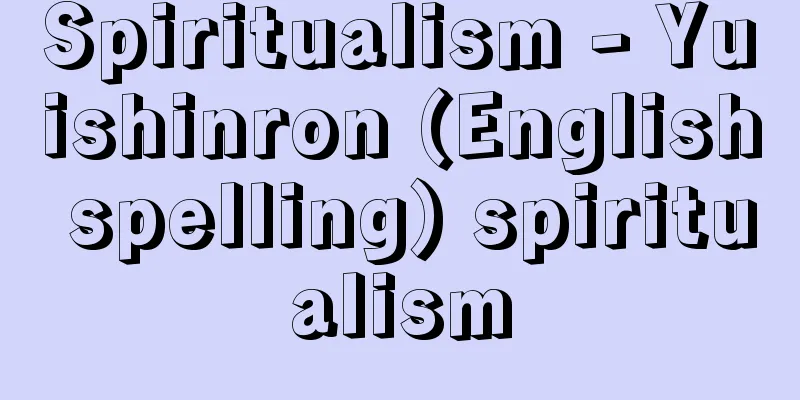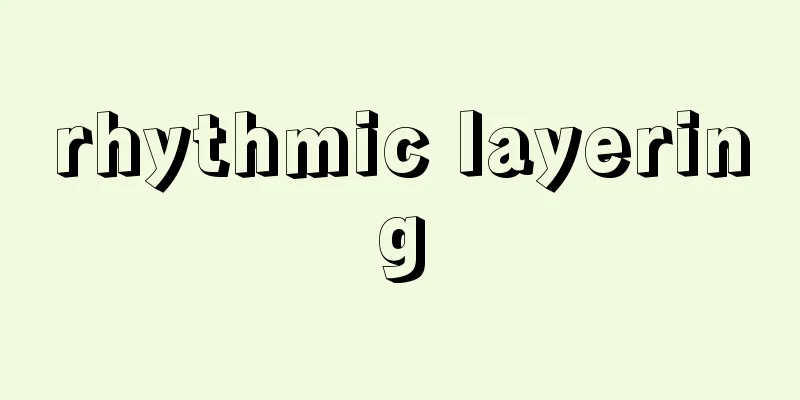Spiritualism - Yuishinron (English spelling) spiritualism

|
A theory that preaches the independent existence and superiority of spirit. Spirit can be viewed in opposition to matter or in opposition to life. The former is the polar opposite of materialism. Idealism does not necessarily deny the existence of matter. Cartesian dualism, which recognizes the two entities of spirit and matter, is also idealism. The lineage of French metaphysics that began with Maine de Biran's voluntarism and continued with F. Rabesson, J. Lachelier, E. Boutreux, and H. Bergson is particularly called French New Idealism, which tends to consider life to be a more fundamental phenomenon than spirit. V. Cousin was the first philosopher to introduce the word spiritualism into philosophy and to describe his philosophy as idealism, and the name New Idealism is understood as a counterpoint to Cousin's eclecticism. On the other hand, there is also idealism (spiritualism) that views spirit and life as being in opposition to each other. When the term spiritualisme began to be used in 17th century France, it was a derogatory term for shallow mystics, and this shows that the religious meaning of the term is historically more primitive. It is a position that asserts the superiority of the mind over the body, and of spirituality over animal life. In this sense, many religions, including Christianity, are idealistic (or rather spiritualistic), and it is also related to issues in morality and sociology. Source: Encyclopaedia Britannica Concise Encyclopedia About Encyclopaedia Britannica Concise Encyclopedia Information |
|
精神の独立した存在と優位を説く学説。精神を物質との対立でとらえる場合と,生命との対立でとらえる場合とがある。前者は唯物論の対極に立つものである。唯心論は必ずしも物体の存在を否定しない。精神と物質の2実体を認めるデカルト的二元論も唯心論である。メーヌ・ド・ビランの主意主義に始り,F.ラベッソン,J.ラシュリエ,E.ブートルー,H.ベルグソンと続くフランス形而上学の系譜は特にフランス新唯心論と呼ばれるが,ここでは生命を精神より根源的な現象と考える傾向がみられる。 spiritualismという言葉を哲学に導入し,おのれの哲学を唯心論とした最初の哲学者は V.クーザンで,新唯心論という名称もクーザンの折衷主義に対するものとして理解される。他方精神と生命を対立的にとらえる唯心論 (精神主義) もある。 spiritualismeという語が 17世紀フランスで使われ始めたときには,浅薄な神秘家に対する蔑称であったことからわかるように,この宗教的な意味のほうが歴史的には原初的である。すなわち肉体に対する精神,動物的生命に対する霊性の優位を主張する立場であり,キリスト教をはじめ多くの宗教がこの意味で唯心論 (というより精神主義) であり,道徳論や社会学の問題にも関係する。
出典 ブリタニカ国際大百科事典 小項目事典ブリタニカ国際大百科事典 小項目事典について 情報 |
>>: Yuishinboshu - Yuishinboshu
Recommend
L'homme armé (English spelling) Lhommearme
...The second type of cantus melody is part of th...
Kawaiisugi - Too cute
...In general, it differs from Japanese species i...
Substrate - Kissit
Generally, it refers to a substance that undergoe...
Terazawa Katataka
Year of death: 18 November 1647 (14 December 1647)...
Fandango - Fandango (English spelling)
A typical Spanish folk dance and song. It can be ...
Aspartate carbamoyltransferase
…Feedback inhibition is essentially different fro...
Ama-shuuraku - Ama-shuuraku
…This fishing village is a village that comes to ...
Cassiopeia A - Cassiopeia A
The first radio source discovered in the constella...
stall barn
...If the enclosure is small, it is called a pen ...
Oki clan
...Kiyotaka's case was the only time that a s...
Tea Act
The law passed by the British House of Commons on ...
Net sorting machine - Amisabakiki
...The encirclement winch is the main equipment o...
Mühldorf (English spelling)
…Duke of Bavaria (1302-47), King of Germany (1314...
Reclam, AP (English spelling) ReclamAP
…In 1828, Anton Philipp Reclam (1807-96), who fou...
"Le Pour et Contre" (English: Le Pour et Contre)
…The government tried to suppress critical speech...









